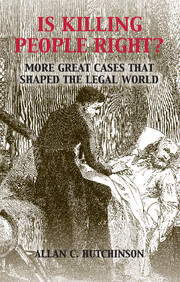Book contents
- Frontmatter
- Dedication
- Contents
- List of figures
- Preface
- 1 Introduction: on the road (again)
- 2 Is killing people right?: law and the end of life
- 3 Oil on troubled waters: the consequences of civil liability
- 4 The politics of law: cats, pigeons and old chestnuts
- 5 The companies we keep: the moralities of business
- 6 Fifty shades of Brown: consent and the criminal law
- 7 Putting up a defence: sex, murder and videotapes
- 8 Wade-ing into controversy: a case of accidental activism
- 9 Playing a different tune: fairness in deal making
- 10 Conclusion: surfing the tides
- Sources
- Index
- References
9 - Playing a different tune: fairness in deal making
Published online by Cambridge University Press: 05 May 2016
- Frontmatter
- Dedication
- Contents
- List of figures
- Preface
- 1 Introduction: on the road (again)
- 2 Is killing people right?: law and the end of life
- 3 Oil on troubled waters: the consequences of civil liability
- 4 The politics of law: cats, pigeons and old chestnuts
- 5 The companies we keep: the moralities of business
- 6 Fifty shades of Brown: consent and the criminal law
- 7 Putting up a defence: sex, murder and videotapes
- 8 Wade-ing into controversy: a case of accidental activism
- 9 Playing a different tune: fairness in deal making
- 10 Conclusion: surfing the tides
- Sources
- Index
- References
Summary
Many people believe that ‘a deal is a deal’. If you promised to do something, you should be obliged to follow through on it whether you made a good or bad deal. This is a moralistic stand often held by those who do not suffer fools gladly: ‘act in haste, repent at leisure’. The law has generally hewed to this stark principle. However, there have developed several excuses or justifications for deviating from its harsh formalistic imperative – duress, mistake, fraud and the like. Yet until recently, the common law has resisted the temptation to peek behind the surface–appearance of particular deal-making promises and evaluate the fairness or substance of the deal. Justice was considered best served by leaving people to work out for themselves what is fair and to agree only to contractual commitments that were in their own best interests.
In recent decades, the common law has begun to adopt a more progressive and interventionist stance. In line with other more socially-minded initiatives, the courts have been prepared to look to the substantive merits of deals and not merely their superficial form before enforcing ill-considered and restrictive deals. In particular, there has been a greater willingness to recognise that not all deal makers are on an equal footing and that modern commerce has strengthened the hand of corporations to exact terms and conditions that might place the average consumer or person in an oppressive bind. Although there is still much disagreement on exactly when deals should be set aside because of their substantive content even when there is clear consent, the common law (reinforced by strong legislative enactments) has placed substantive fairness and ‘unconscionability’ closer to the heart of contract and commercial law. The courts’ concern is no longer only with the fairness of the contract-formation process, but also with the fairness of the outcome.
The leading case is an English one from the late 1960s and 1970s when the social world was beginning to experience significant change and realignment. Fittingly, it involved the world of Tin Pan Alley where big business and musical innovation collided. Young musicians and composers were looking for a foothold in the burgeoning music scene; they often made hasty and imprudent deals with wily music publishers.
- Type
- Chapter
- Information
- Is Killing People Right?More Great Cases that Shaped the Legal World, pp. 132 - 147Publisher: Cambridge University PressPrint publication year: 2016



